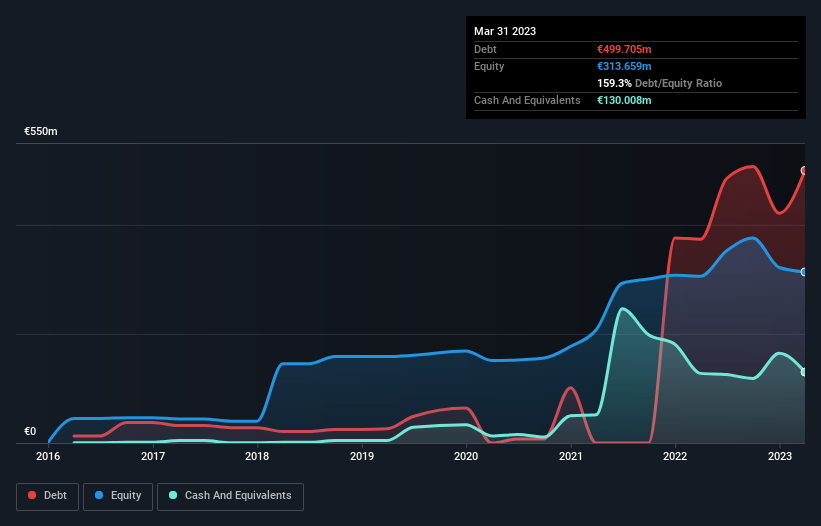Here's Why MGI - Media and Games Invest (ETR:M8G) Has A Meaningful Debt Burden

The external fund manager backed by Berkshire Hathaway's Charlie Munger, Li Lu, makes no bones about it when he says 'The biggest investment risk is not the volatility of prices, but whether you will suffer a permanent loss of capital.' When we think about how risky a company is, we always like to look at its use of debt, since debt overload can lead to ruin. We note that MGI - Media and Games Invest SE (ETR:M8G) does have debt on its balance sheet. But the more important question is: how much risk is that debt creating?
When Is Debt Dangerous?
Generally speaking, debt only becomes a real problem when a company can't easily pay it off, either by raising capital or with its own cash flow. Part and parcel of capitalism is the process of 'creative destruction' where failed businesses are mercilessly liquidated by their bankers. However, a more common (but still painful) scenario is that it has to raise new equity capital at a low price, thus permanently diluting shareholders. Having said that, the most common situation is where a company manages its debt reasonably well - and to its own advantage. The first thing to do when considering how much debt a business uses is to look at its cash and debt together.
View our latest analysis for MGI - Media and Games Invest
How Much Debt Does MGI - Media and Games Invest Carry?
The image below, which you can click on for greater detail, shows that at March 2023 MGI - Media and Games Invest had debt of €499.7m, up from €373.5m in one year. However, it does have €130.0m in cash offsetting this, leading to net debt of about €369.7m.

How Healthy Is MGI - Media and Games Invest's Balance Sheet?
The latest balance sheet data shows that MGI - Media and Games Invest had liabilities of €182.6m due within a year, and liabilities of €499.7m falling due after that. Offsetting these obligations, it had cash of €130.0m as well as receivables valued at €61.2m due within 12 months. So its liabilities outweigh the sum of its cash and (near-term) receivables by €491.1m.
This deficit casts a shadow over the €172.0m company, like a colossus towering over mere mortals. So we definitely think shareholders need to watch this one closely. At the end of the day, MGI - Media and Games Invest would probably need a major re-capitalization if its creditors were to demand repayment.
We measure a company's debt load relative to its earnings power by looking at its net debt divided by its earnings before interest, tax, depreciation, and amortization (EBITDA) and by calculating how easily its earnings before interest and tax (EBIT) cover its interest expense (interest cover). This way, we consider both the absolute quantum of the debt, as well as the interest rates paid on it.
While MGI - Media and Games Invest's debt to EBITDA ratio (4.2) suggests that it uses some debt, its interest cover is very weak, at 0.98, suggesting high leverage. It seems that the business incurs large depreciation and amortisation charges, so maybe its debt load is heavier than it would first appear, since EBITDA is arguably a generous measure of earnings. So shareholders should probably be aware that interest expenses appear to have really impacted the business lately. The good news is that MGI - Media and Games Invest grew its EBIT a smooth 33% over the last twelve months. Like the milk of human kindness that sort of growth increases resilience, making the company more capable of managing debt. When analysing debt levels, the balance sheet is the obvious place to start. But ultimately the future profitability of the business will decide if MGI - Media and Games Invest can strengthen its balance sheet over time. So if you want to see what the professionals think, you might find this free report on analyst profit forecasts to be interesting.
Finally, while the tax-man may adore accounting profits, lenders only accept cold hard cash. So we always check how much of that EBIT is translated into free cash flow. Over the last three years, MGI - Media and Games Invest actually produced more free cash flow than EBIT. That sort of strong cash conversion gets us as excited as the crowd when the beat drops at a Daft Punk concert.
Our View
While MGI - Media and Games Invest's level of total liabilities has us nervous. To wit both its conversion of EBIT to free cash flow and EBIT growth rate were encouraging signs. Taking the abovementioned factors together we do think MGI - Media and Games Invest's debt poses some risks to the business. So while that leverage does boost returns on equity, we wouldn't really want to see it increase from here. When analysing debt levels, the balance sheet is the obvious place to start. However, not all investment risk resides within the balance sheet - far from it. For example, we've discovered 2 warning signs for MGI - Media and Games Invest (1 is significant!) that you should be aware of before investing here.
If, after all that, you're more interested in a fast growing company with a rock-solid balance sheet, then check out our list of net cash growth stocks without delay.
New: Manage All Your Stock Portfolios in One Place
We've created the ultimate portfolio companion for stock investors, and it's free.
• Connect an unlimited number of Portfolios and see your total in one currency
• Be alerted to new Warning Signs or Risks via email or mobile
• Track the Fair Value of your stocks
Have feedback on this article? Concerned about the content? Get in touch with us directly. Alternatively, email editorial-team (at) simplywallst.com.
This article by Simply Wall St is general in nature. We provide commentary based on historical data and analyst forecasts only using an unbiased methodology and our articles are not intended to be financial advice. It does not constitute a recommendation to buy or sell any stock, and does not take account of your objectives, or your financial situation. We aim to bring you long-term focused analysis driven by fundamental data. Note that our analysis may not factor in the latest price-sensitive company announcements or qualitative material. Simply Wall St has no position in any stocks mentioned.
About XTRA:M8G
Verve Group
A digital media company, engages in the provision of ad-software solutions in North America and Europe.
Good value with reasonable growth potential.
Similar Companies
Market Insights
Community Narratives



